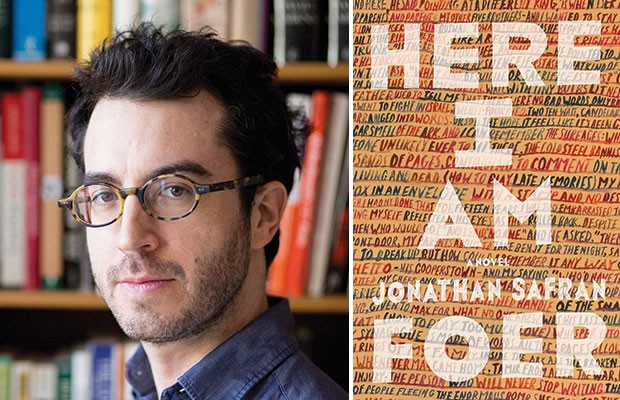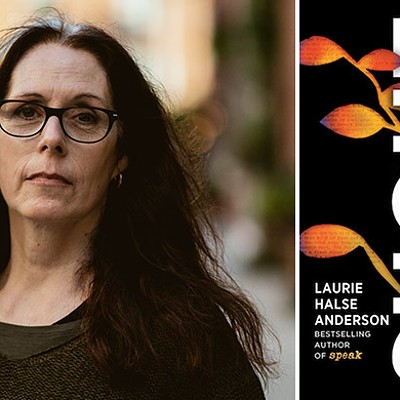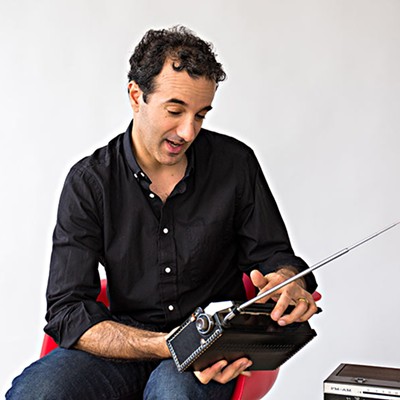There is an old Jewish story about two children who are playing hide and seek. One boy hides, but after a time the other stops looking for him. Angry and disappointed, the first boy runs to his grandfather to complain. “This is God’s complaint as well,” his grandfather tells him. “‘I hide but nobody looks for me.’”
Parables like this one came to mind when I spoke with Jonathan Safran Foer about his 2016 novel, Here I Am. Foer’s protagonists have consistently shared a theme of being in some way lost (or having lost something) and quelling their anxiety through searching. Here I Am is a novel with characters who are looking for something, but its maturity reflects how much harder the game becomes when you’re an adult.
The title is taken from the biblical account of Abraham, who says the phrase twice: once when he is called upon by God to sacrifice his son Isaac, and again when the angel stops Abraham when the knife is in his hand. Because of his willingness to sacrifice his only and beloved son, Abraham is forever revered for his faith.
Isaac’s son was named Jacob, also the name of Foer’s protagonist in Here I Am. Jacob has three sons and a failing marriage. He has a difficult relationship with his own father, Irv. Like Foer’s other two novels, Everything Is Illuminated (2002) and Extremely Loud and Incredibly Close (2005), Here I Am is a story about fathers and sons. However, where the previous two were about sons looking for their fathers and grandfathers, Here I Am focuses on what it is to be a father who’s not yet found. Foer’s protagonist is still searching, but for what? Or for who? The clues are as elusive as whatever it is he’s looking for.
Foer, who speaks here June 7 courtesy of Pittsburgh Arts & Lectures, doesn’t himself have the answers; whatever search he’s set his characters on, it’s a sincere one. “I work hard to keep my process open to what will come: intuitions, things that might seem inefficient, or might seem like distractions at the time,” says Foer, 40, speaking by phone from his home in Brooklyn. “There really isn’t anything that I either wanted it to be about or for people to take away.”
The matured subject matter perhaps reflects happenings in Foer’s own life. In the time since the publication of Extremely Loud, he has become a father and a husband. Professionally, he’s now a writer-in-residence at New York University where he teaches creative writing. He says that his students provide him with inspiration, and the experience of teaching leads him to reflect on his own craft. One of the things he teaches his students is to be open: to discover things in their writing. A writer’s process is, essentially, a constant state of searching: for the right word, the right motivation, the right subject, the right thing that a character might do or say. It is this process of discovery that seems to impel him as a storyteller. “There’s no argument that I have to make,” he said. “There’s no characters that are living inside me that I want to share, there’s no story that I have to tell, there’s no voice that I’ve found … just a kind of pressure, inside, that I want relieved.”
In the past, Foer’s characters found some form of what they were looking for. But Here I Am is much more about the searching than the finding. It is a story where big and small crises compete with and contradict one another: Jacob tries to plan his son Sam’s bar mitzvah; the state of Israel is threatened by disasters; the family dog is dying. For Jacob, faith and sacrifice are part of the problems of fatherhood, marriage and being Jewish (the novel’s teaser asks readers if they would be willing to sacrifice themselves for these things).
“There’s so many ways and reasons to run out of steam, to doubt, to want to give up,” says Foer. “What will it be that keeps you going? Keeps you caring?” Foer’s characters have to search for this, too. It’s a journey that makes them angry and disappointed, but they can’t find what they don’t go searching for.

















